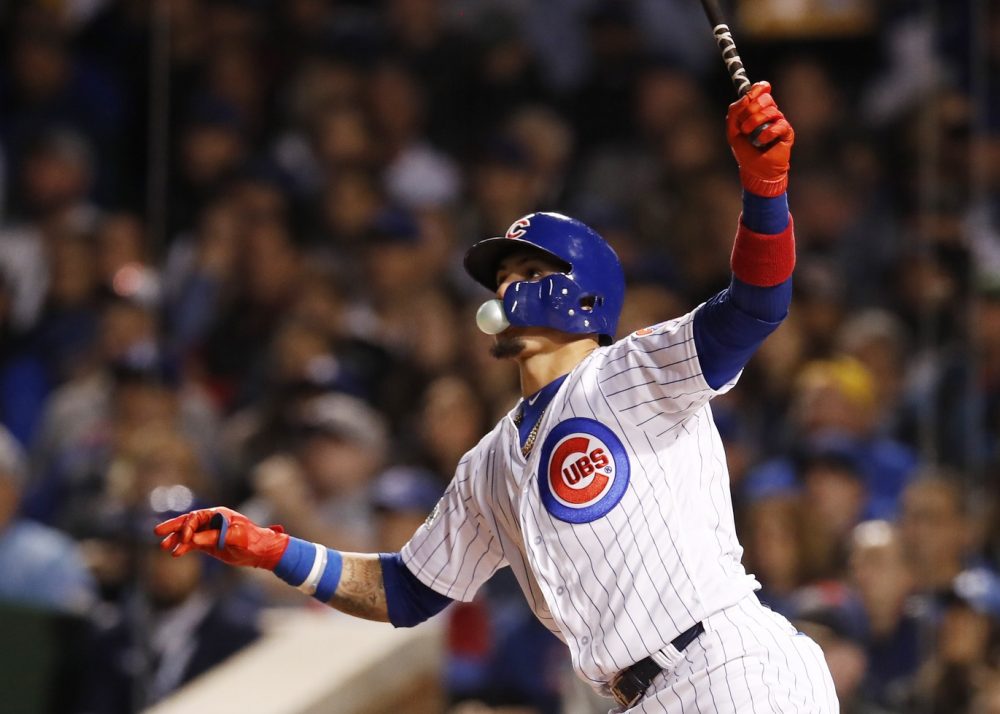
Baseball is fundamentally a child’s game. We’ve built temples to it, these huge palaces of brick, glass, and stone to surround an idyllic field on which we forget the simple joy that comes with play. It can be hard to remember this fact—that this is fundamentally a thing of balls and sticks and hearts and wits—and at no point is it more difficult to recall this than at the moment of elimination.
Competition is written into the inky lifeblood of this game we’ve conscripted, even at its purest form, but when we’re very, very lucky, we’re able to watch those who can compete without falling prey to that fun-stealing darkness which stalks every man, woman, and child to touch the game.
Javier Baez is one of those players.
Last night’s game will appear years from now in the sports section of your local difficult pub quiz. Oddities included all five runs, inclusive, being scored on solo home runs; Joe Maddon becoming the only manager to be ejected from a game twice during the same postseason series; and prior to the Maddon ejection, an incredibly odd foul-tip-that-wasn’t that involved the highest decibel level yet at Wrigley Field, an umpire conference, and a probable slap on the wrist for a video board operator; plus the heroic effort of Jake Arrieta, working against his own narrative and recording a rare sixth-inning out against Los Angeles.
All of that, though, paled in comparison to the player of the game, one formerly hitless-for-the-postseason Javy Baez, and his two home runs.
Baez has been a frustrating player for much of his major-league career. One of the greatest pure athletic talents in the game, he’s never quite seemed to be able to put together all the pieces all at once, and his youth and inexperience have led to mistakes in new and exciting ways. Of course, that fire has also led to some of the greatest plays seen at the keystone, and his ability there brought about an entirely new area of baseball discussion—the tag.
Baez has one of baseball’s best gloves at the moment, a truly game-changing defensive weapon that he’s been better able to harness as he matures in the game. We’ve seen the Baez tag in effect this series, of course, including an extremely gif-able moment between Baez and fellow enjoyer-of-the-game Yasiel Puig.
Baez + Puig = hilarious pic.twitter.com/FxdSkrcaSG
— That Dude (@cjzer0) October 18, 2017
We hadn’t, however, seen the other tool that Baez has been known for since he first made himself known as a professional—the raw 80-grade power. The 0-for-20 postseason slump Baez broke last night isn’t that unusual for him. For all the other areas in which he’s extremely gifted, Baez has never managed to manage the strike zone or display a sense of pitch recognition. Fortunately for him, and for the Cubs (especially in Game 4), when Baez does connect with a pitch, he can send it an incredibly long way.
So sure, the offensive package may come with a lot of swings and misses, but like some of the other younger players coming into the league, Baez may be an invitation to re-evaluate what we’ve previously quantified as being more or less valuable.
Above all else, though, Baez does play with a visible sense of joy, one that’s tangible and real. The tag and interplay between Puig and Baez in Game 3 got some criticism, because how dare he show joy, how dare he not take the game seriously at that moment, when his team was going down 3-0 and he himself had yet to productively connect bat to ball. This view feels sour, especially at the current moment in time. Joy is precious, and baseball’s a game. Hold onto the hope, and the game will come to you.
Thank you for reading
This is a free article. If you enjoyed it, consider subscribing to Baseball Prospectus. Subscriptions support ongoing public baseball research and analysis in an increasingly proprietary environment.
Subscribe now